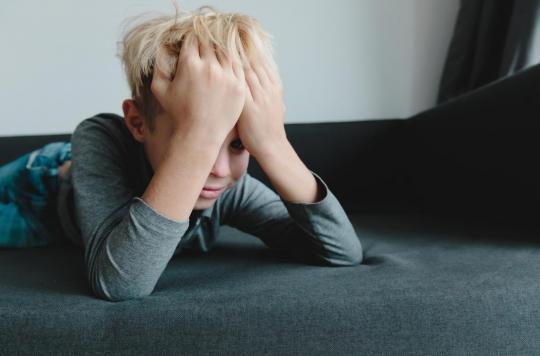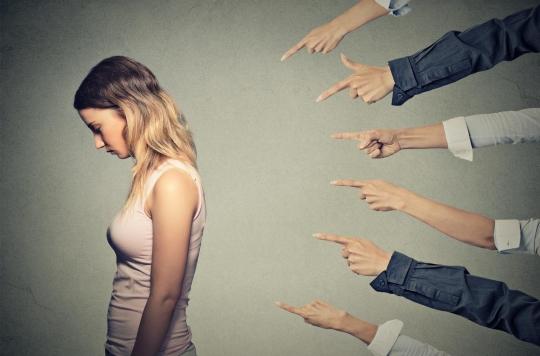The sexual harassment bill punishes perpetrators, but victims often feel lost. To respond to this distress, an emergency cell tries to restore their confidence

“Everything was going well until the day my boss physically stuck me against a wall to try to kiss me, testifies Mathilde, 32, an executive in a service company. I was very scared, because I did not expect it at all. I managed to free myself and I went home, completely unsettled… He repeated his advances. Then faced with my refusal, I was put aside. ”
Quickly this combative woman succeeds in changing jobs. But, she suffered several waves of depression and attempted suicide. “For several weeks, I did not dare to talk about it, even to my relatives”. Mathilde’s case is no exception. “The victims of sexual harassment find themselves in a situation of great distress,” explains Charles Peretti, head of psychiatric services at Saint-Antoine hospital and Tenon hospital in Paris. The victims are sometimes harassed for months, they are under very great stress. There is an attack on physical and psychological integrity, a drop in self-esteem, sleep disturbances, suicidal thoughts and suicide attempts. “
Prof. Charles Peretti, psychiatrist, head of psychiatry services at Saint-Antoine hospital and Tenon hospital in Paris: “Being a victim of sexual harassment has a real impact on health”
To respond to these health problems, for the first time in France, a psychological care unit was created in Paris, at the instigation of Lydia Guirous, president of the association. Future, feminine. “Many women are victims of sexual harassment every year, explains the president of the association created in 2010. Until then, the associative world had engaged in the legal support of harassment procedures but never in the support therapeutic. The original partnership that I set up with Prof. Peretti aims to provide a concrete and effective response to suffering victims. “
What is it about ? From a toll-free number, (0800 00 46 41) made available to victims of sexual harassment. “A secretary takes calls. It then transmits to around thirty psychiatrists and psychologists from the hospitals of Saint-Antoine and Tenon, describes Professor Peretti. Each of them will take care during the day or the next day to contact one of the victims who called for a first assessment interview. “
Prof. Charles Peretti: “ Following the first assessment interview, a diagnosis will be made and a therapeutic proposal will be decided with the person. “
After sexual harassment, medical and psychological support is important. Specialists have noted that being a victim once increases the risk of being victimized again … american study recent study of 6,000 women victims of sexual assault confirms this risk. Half of these people were victims of multiple assaults and 20% of them suffered from post traumatic syndrome (PTSD).
“This is explained by a feeling of guilt developed by the victim. It is a real danger, underlines Pr Louis Jehel, head of the psychiatry department at the CHU of Fort de France. This is an important element of the disturbances that victims of assault or harassment may feel that must be taken into account. ”
“The legal services should also take better account of this feeling of guilt,” believes Ariane Bilheran, psychologist, director and consultant of the company Sémiode, author of several books on harassment. When a victim takes the complaint process to the police, this feeling of guilt serves her. The police officer thinks she has something to be ashamed of. ”
The problem is that sexual harassment is still a taboo reality in France. “The victims are often ashamed and prefer to leave the company, rather than reporting it internally,” notes Ariane Bilheran. It happened to me to meet women who were constantly humiliated, who repeated: “It does not matter” and preferred to run away. There needs to be more training and prevention in this area. We are light years from Quebec, for example. It has been thirty-two years since there has been in this province of Canada a help and information group on harassment at work. ”
A taboo reality which is explained by a social failure and a problem of cultural education, for Ariane Bilheran. “If harassment is carried out from individuals to individuals, we must not forget the collective dimension: harassment is possible because in a service, a permissive, disrespectful, sexist climate floats”, underlines Ariane Bilheran.
And that can sometimes take delusional forms. “As part of a weekly service meeting in a company, the employees of this service who attended had the unpleasant surprise to see in a slide show, a pornographic photo montage which represented them”, reports the psychologist. “Everyone is laughing. And it goes as if nothing had happened. This type of environment opens the door to harassment. There is a real social and cultural education problem to take into account. “
Will the situation change in France? A new law Project was presented this week in the Council of Ministers. This text punishes one year in prison and a fine of € 15,000 “the fact of repeatedly imposing on a person gestures, words or any other acts of a sexual connotation, either detrimental to his or her dignity, (…) or creating a hostile, degrading or offensive environment“ . It provides for aggravating circumstances bringing the penalty to three years in prison and a fine of € 45,000.
But the text is already arousing criticism from associations such as the European Association against violence against women at work (AVFT. It is the term “impose” which in particular reacts the general delegate, Marilyn Baldeck. “It is sometimes difficult to prove to the judge the fact that the acts were imposed ”.
.

















